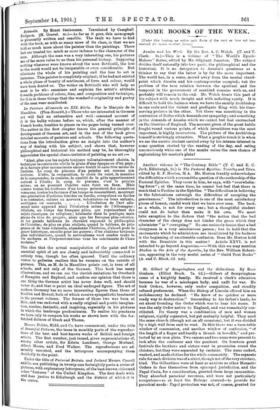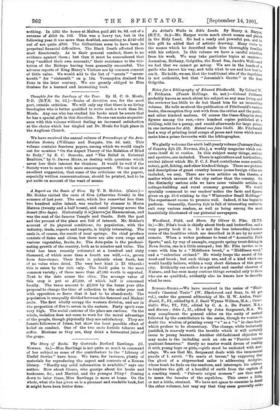St. Gilbert of Elempringham and the Gilbertines. By Rose Graham.
(Elliot Stock. 'Is. 6d.)—Gilbert of Sempringham came of a knightly family. He received a clerk's education because he was of a misshapen body, and unfit for war. He took Orders, however, only under compulsion, and steadily refused preferment. When the Bishop of Lincoln offered him an archdeaconry he declined. "He knew of no quicker or more ready way to destruction." Succeeding to his father's lands, he set about founding the Order which was to bear his name. It was the only Order native to England, and was remarkably con- stituted. Its theory was a combination of men and women religions, rigidly separated, but yet mutually helpful. They used the same church (though not on all occasions), but it was divided by a high wall from east to west. In this there was a turn-table window of communion, and another window of confession, "of the length of a finger and hardly a thumb in bresdth," and pro- tected by an iron plate. Two canons and two nuns were present to look after the confessor and the penitent. On fourteen great festivals the brothers and sisters went in procession round the cloisters, but they were separated by curtains. The nuns cooked, washed, and made clothes for the whole community. The separate rule for each division was of a strict,though not of the very strictest, kind. The Gilbertines were at least as anxious as other Monastic Orders to free themselves from episcopal jurisdiction, and the Papal Curia, for a consideration, granted them large immunities. They absorbed parochial revenues, and were not particularly scrupulous—so at least the Bishops averred—to provide for parochial needs : Papal protection was not, of course, granted for
nothing. In 1252 the house at Mahon paid 461 8s. 8d. out of a revenue of 4619 9s. 10d. This was a heavy tax, but in the following year it was more than doubled, amounting to £140 odd out of not quite 4700. The Gilbertines seem to have been in perpetual financial difficulties. The Black Death affected them most disastrously. As to their general conduct, there is no evidence against them ; but then it must be remembered that they "audited their own accounts," their resistance to the visi- tation of the Bishops having been generally successful. The adverse reports of King Henry's Visitors are by common consent of little value. We would add to the list of "errata" "seven- teenth" for " sixteenth " on p. 134. Vermuyden drained the Fens in the later century. We are greatly obliged to Miss Graham for a learned and interesting book.







































 Previous page
Previous page